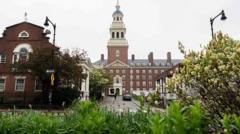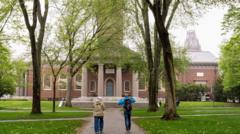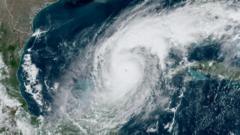As Harvard prepares to address the impact of a government ban on international students, individuals like Shreya Mishra Reddy and Abdullah Shahid Sial find themselves in limbo, caught between hopes for a bright future and fears of being deported.
Harvard's International Students Grapple with Uncertainty Amid Government Crackdown

Harvard's International Students Grapple with Uncertainty Amid Government Crackdown
International students at Harvard face an uncertain future as the Trump administration's new restrictions create chaos ahead of graduation.
With graduation looming, Shreya Mishra Reddy has troubling news for her loved ones back in India: she may not complete her executive leadership program at Harvard due to a recent decision by the Trump administration aimed at halting the enrollment of international students. "Harvard is the ultimate school that anybody in India wants to get into," she shares, as over 6,800 foreign students, who account for more than 27% of the university's population, find themselves in uncertain circumstances. The government argues that Harvard's alleged disregard for the law justifies the ban, while the university denounces it as "unlawful," indicating potential legal action.
As prospective and current students grapple with the implications of this policy shift, many are unsure of their next steps. For those in the midst of their studies, transferring to other institutions for visa retention may be the only option. Reddy hopes for a resolution, asserting, "I hope Harvard will stand for us and some solution can be worked out."
The crackdown has broader implications as international students constitute a significant part of the educational ecosystem in the U.S., contributing valuable revenue to institutions like Harvard. The Trump administration's mounting restrictions against universities associated with pro-Palestinian protests have put additional pressure on these institutions, sparking fears of further implications for more than a million international students nationwide.
Kat Xie, a second-year STEM student from China, expresses disbelief at the announcement, saying, "I had almost forgotten about the earlier threat... and then Thursday's announcement suddenly came." With options dwindling, she laments the costly and cumbersome paths to continue studying in the U.S.
Further complicating the situation, students like Abdullah Shahid Sial from Pakistan, who was among the few admitted to Harvard, feel the pressure of heightened scrutiny. "None of this is what we signed up for," he says, highlighting fears that have emerged in a climate where foreign students feel targeted.
As uncertainty persists, students are reconsidering trip plans and fearing potential re-entry challenges, compounding their anxieties. Jiang Fangzhou, a public administration student, reflects on the profound disconnect this ban creates, affecting not just current students but those who were poised to start their academic journeys at Harvard. "Think about the incoming ones," she stresses, as many who turned down offers from other institutions find themselves unexpectedly stranded, facing daunting futures.
As prospective and current students grapple with the implications of this policy shift, many are unsure of their next steps. For those in the midst of their studies, transferring to other institutions for visa retention may be the only option. Reddy hopes for a resolution, asserting, "I hope Harvard will stand for us and some solution can be worked out."
The crackdown has broader implications as international students constitute a significant part of the educational ecosystem in the U.S., contributing valuable revenue to institutions like Harvard. The Trump administration's mounting restrictions against universities associated with pro-Palestinian protests have put additional pressure on these institutions, sparking fears of further implications for more than a million international students nationwide.
Kat Xie, a second-year STEM student from China, expresses disbelief at the announcement, saying, "I had almost forgotten about the earlier threat... and then Thursday's announcement suddenly came." With options dwindling, she laments the costly and cumbersome paths to continue studying in the U.S.
Further complicating the situation, students like Abdullah Shahid Sial from Pakistan, who was among the few admitted to Harvard, feel the pressure of heightened scrutiny. "None of this is what we signed up for," he says, highlighting fears that have emerged in a climate where foreign students feel targeted.
As uncertainty persists, students are reconsidering trip plans and fearing potential re-entry challenges, compounding their anxieties. Jiang Fangzhou, a public administration student, reflects on the profound disconnect this ban creates, affecting not just current students but those who were poised to start their academic journeys at Harvard. "Think about the incoming ones," she stresses, as many who turned down offers from other institutions find themselves unexpectedly stranded, facing daunting futures.






















